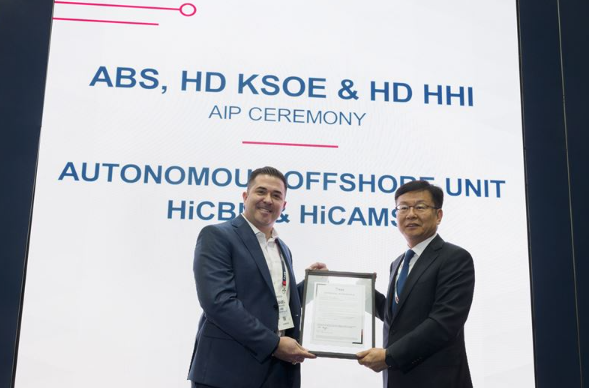
| Subject | KSOE receives AiP for HiCBM & HiCAMS from ABS | ||
|---|---|---|---|
| Reg. date | 2024-05-21 | Views | 436 |

[Ship Management/ May 7, 2024] ABS has awarded approval in principle (AIP) to two critical autonomous functions on a proposed offshore platform in the latest phase of its pioneering collaboration with HD Hyundai Group.
The artificial intelligence-based Autonomous Machinery Health Management Function (HiCBM) and the Autonomous Safety Management Function (HiCAMS) both received AIP from ABS at the Offshore Technology Conference,Monday May 6, 2024, in Houston.
HiCBM and HiCAMS received ABS product design assessments for ships throughout 2022 and 2023. Now, ABS is supporting their application to the offshore industry.
The certificates are just the latest stage in ABS and HD Hyundai Group’s collaboration, building on shared efforts to expand the development of autonomous ship technology into critical offshore platform machinery and safety systems.
“Autonomous technologies hold significant promise to advance safety and efficiency at sea for the whole industry,” said Christopher J. Wiernicki, ABS Chairman and CEO. “Together, ABS and HD Hyundai Group have made huge strides in realizing that potential and developing the components that lead to a future with autonomous functions.”
“This cooperation with ABS has great significance in that we have begun the development of AI solutions for offshore platforms in earnest based on our previous experience in developing AI solutions for ships together with ABS,” said Kwang-Pil Chang, CTO of HD KSOE. “HD Hyundai Group will lead the market in technologies and safety enhancements for unmanned offshore platforms based on cutting edge AI technologies.”
Award of the ABS AIPs follows the signing of an MOU to work together on industry-leading autonomous projects, that built upon a previous Strategic Framework Agreement where ABS worked with both KSOE and HD Hyundai subsidiary, Avikus. Among the achievements was the landmark liquefied natural gas carrier, Prism Courage, that sailed in autonomous mode, under direct supervision, for roughly half of its voyage across the Pacific Ocean.
 HOME
HOME








